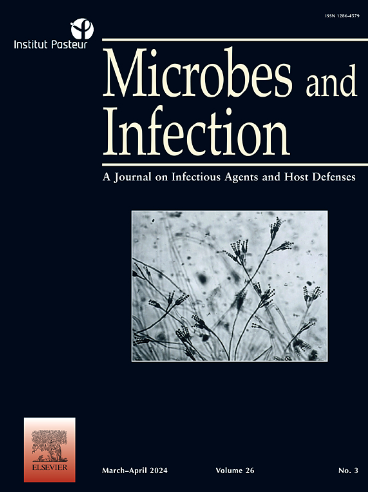Macrophage-depleted young mice are beneficial in vivo models to assess the translocation of Klebsiella pneumonia from the gastrointestinal tract to the liver in the elderly
IF 2.6
4区 医学
Q3 IMMUNOLOGY
引用次数: 0
Abstract
Pathobionts are commensal intestinal microbiota capable of causing systemic infections under specific conditions, such as environmental changes or aging. However, it is unclear how pathobionts are recognized by the intestinal mucosal immune system under physiological conditions. This study demonstrates that the gut pathobiont Klebsiella pneumoniae causes injury to the epithelium and translocates to the liver in specific pathogen-free mice treated with clodronate-liposomes that depleted macrophages. In the clodronate-liposome-treated mice, indigenous classical K. pneumoniae (cKp) with non-K1/K2 capsular serotypes were isolated from the liver, indicating that gut commensal cKp translocated from the gastrointestinal tract to the liver due to the depletion of intestinal macrophages. Oral inoculation of isolated cKp to clodronate-liposome-treated mice significantly reduced the survival rates compared to that of non-treated mice. Our findings demonstrate that intestinal mucosal macrophages play a pivotal role in sensing commensal cKp and suppressing their translocation to the liver. This study demonstrates that clodronate-liposome-treated mouse models are effective for screening and evaluating drugs that prevent the translocation of cKp to the liver, providing new insights into the development of preventive protocols against K. pneumoniae infection.
巨噬细胞耗竭的年轻小鼠是一种有益的体内模型,可用于评估肺炎克雷伯氏菌从胃肠道转移到老年人肝脏的情况。
病原微生物是一种肠道共生微生物群,能够在特定条件下(如环境变化或老化)引起全身感染。然而,目前还不清楚在生理条件下肠道粘膜免疫系统如何识别病原菌。本研究证明,肠道致病菌肺炎克雷伯氏菌会对上皮细胞造成损伤,并在使用克洛膦酸脂质体(耗尽巨噬细胞)处理的特定无病原体小鼠体内转移到肝脏。在氯屈膦酸脂质体处理过的小鼠中,从肝脏中分离出了非 K1/K2 胶囊血清型的本地经典肺炎克氏菌(cKp),这表明肠道共生的 cKp 由于肠道巨噬细胞的耗竭而从胃肠道转移到了肝脏。将分离出的 cKp 口服接种到氯屈膦酸脂质体处理的小鼠体内,与未处理的小鼠相比,存活率明显降低。我们的研究结果表明,肠粘膜巨噬细胞在感知共生 cKp 并抑制其向肝脏转移方面发挥着关键作用。这项研究表明,氯屈膦酸脂质体处理的小鼠模型能有效筛选和评估阻止 cKp 转位至肝脏的药物,为开发肺炎克氏菌感染的预防方案提供了新的思路。
本文章由计算机程序翻译,如有差异,请以英文原文为准。
求助全文
约1分钟内获得全文
求助全文
来源期刊

Microbes and Infection
医学-病毒学
CiteScore
12.60
自引率
1.70%
发文量
90
审稿时长
40 days
期刊介绍:
Microbes and Infection publishes 10 peer-reviewed issues per year in all fields of infection and immunity, covering the different levels of host-microbe interactions, and in particular:
the molecular biology and cell biology of the crosstalk between hosts (human and model organisms) and microbes (viruses, bacteria, parasites and fungi), including molecular virulence and evasion mechanisms.
the immune response to infection, including pathogenesis and host susceptibility.
emerging human infectious diseases.
systems immunology.
molecular epidemiology/genetics of host pathogen interactions.
microbiota and host "interactions".
vaccine development, including novel strategies and adjuvants.
Clinical studies, accounts of clinical trials and biomarker studies in infectious diseases are within the scope of the journal.
Microbes and Infection publishes articles on human pathogens or pathogens of model systems. However, articles on other microbes can be published if they contribute to our understanding of basic mechanisms of host-pathogen interactions. Purely descriptive and preliminary studies are discouraged.
 求助内容:
求助内容: 应助结果提醒方式:
应助结果提醒方式:


